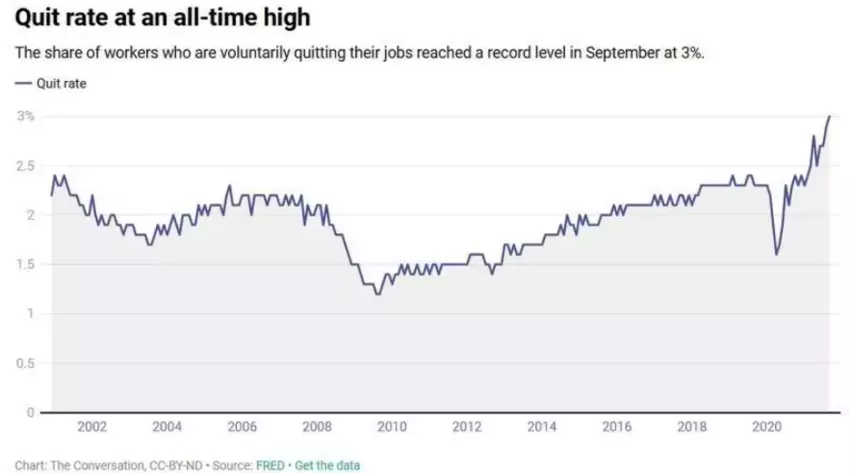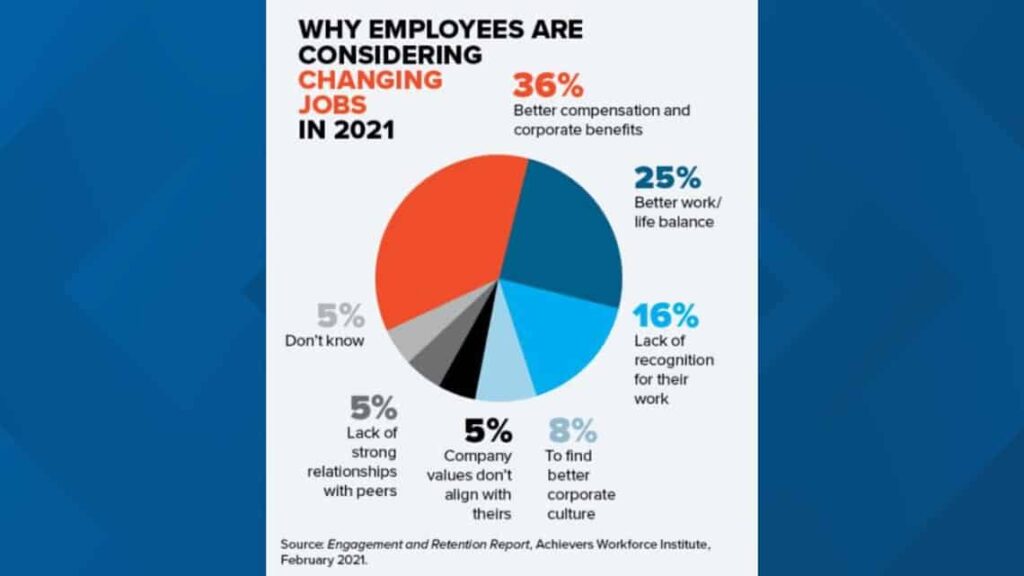At Kindbridge, we’re aware of the underlying causes of the Reddit r/antiwork movement which has enabled likeminded people to connect online. However, our views on the Great Resignation are impartial. Our focus is to provide comprehensive mental health support to anyone affected by the issues raised in this blog.
The Great Resignation gained momentum in 2021 and shows no signs of slowing down as employees reassess their work-life balance and refuse to tolerate exploitative workplace practices.
This blog looks at the antiwork movement and why people are quitting their jobs. It explores how employers can retain valued workers by addressing toxic work environments and prioritizing employee mental health.
What is the antiwork movement?
The Reddit forum r/antiwork (also known as the anti-work subreddit) has the slogan: “Unemployment for all, not just the rich!” The group is “for those who want to end work, are curious about ending work, want to get the most out of a work-free life, want more information on anti-work ideas and want personal help with their own jobs/work-related struggles.”
Set up in 2013, there are currently 1.6 million members – known as idlers – up from 13,000 in 2019. The antiwork movement gained a huge influx of members in October 2021 after a warehouse worker posted a screenshot of a text exchange with their boss, at the end of which they resigned. It went viral which led to a wave of people joining r/antiwork and quitting their jobs. The r/antiwork community has also raised its profile in recent months by coordinating a Black Friday boycott against Amazon and bombarding the Kellogg’s website with fake job applications to make it more difficult for the organization to replace striking workers.
One of the most common objections to the antiwork movement is that if everyone stops working, society will collapse. However, the r/antiwork community insists that it is not against effort, labor or being productive but rather it’s opposed to exploitative work practices and hierarchical structures. In reality, antiwork means different things to different people.
What is the Great Resignation?

This explosion in antiwork interest has coincided with the “Great Resignation” (also called “The Big Quit”). Since the start of the COVID-19 pandemic, millions of Americans have reassessed their work-life balance and left the workforce or changed careers. According to the US Bureau of Labor Statistics, 4.5 million people quit their job in November 2021 – after several months of abnormally high resignation rates. At the same time, there were 10.6 million job openings across the US. Many industries are experiencing a talent shortage with the largest exodus in accommodation, food services, health care, social assistance, transportation, warehousing and utilities.
This trend in US and global work resignation looks set to continue. The Microsoft 2021 Work Trend Index, which surveyed more than 30,000 people in 31 countries, found that 41% of workers were considering leaving their employer. Research by HR software company Personio of workers in the UK and Ireland showed that over a third of employees are looking to change roles in the next six to 12 months.
Why are people quitting their jobs?

There are several reasons why workers are quitting their jobs and seeking a change:
1. Reassessing priorities during the COVID-19 pandemic
For some employees, the pandemic has given them a chance to slow down and reassess their priorities. It has been the catalyst they needed to pursue their dream career or take time off to be a stay-at-home parent. For other workers, their decision to resign was precipitated by the way their employer treated them during the pandemic.
2. Poor working conditions
Burned-out workers have decided that enough is enough. They are sharing stories of low wages, staff shortages, long working hours, unmanageable workloads, and no employee benefits or paid sick leave. Poor working conditions may be sustainable for short periods but longer term they can have serious effects on employee mental health and well-being.
3. Support network
The r/antiwork forum and Great Resignation movement have given people who are trapped and exploited in their jobs the confidence to quit. Finding out about other people’s stories and experiences – and having an online support network – has provided reassurance and encouragement.
4. Toxic workplace culture
Over the last two years, millions of workers have switched to remote working to help curb the spread of the virus. In doing so, they have enjoyed a welcome break from toxicity in the workplace caused by management, co-workers or the company culture itself. They do not want to return to a toxic and unhealthy working environment. It can have a terrible toll on their morale, engagement, performance and mental health – leading to increased levels of stress, anxiety and depression.
How companies can retain workers
Could r/antiwork and the Great Resignation bring about meaningful changes to workplace culture? Here are several ways that organizations can avoid job losses and retain workers:
- Value employees – A major reason why workers leave their job is not poor pay but the lack of feeling valued. 66% of staff said they would quit if they felt unappreciated. Employees who feel valued are likely to have higher morale, increased motivation and greater commitment.
- Offer flexible working – The COVID-19 pandemic has forced many employers to become more flexible and workers want this to continue – 48% of employees surveyed by communications consultancy the Grossman Group said they wanted to continue working from home after the pandemic. Increased flexibility – such as remote jobs or hybrid working, compressed hours, part-time options and shorter working weeks – is an important aspect of staff retention.
- Train and upskill staff – A Gallup survey, commissioned by Amazon in June 2021, found that 57% of US workers want to update their skills and 48% would consider switching jobs to do so. Training and development opportunities are therefore key to staff retention and reducing anti-work sentiments. At Kindbridge we are committed to training our therapists to improve their clinical efficacy, including gaming disorder training and process addictions.
- Respond to staff concerns – Forward-looking organizations listen to the concerns of staff and do something to address them. When there is an open communication culture, employees feel empowered to share their concerns without fear of negative repercussions. This can include employee satisfaction surveys, town hall Q&A sessions or regular one-to-one meetings. Listening to feedback and implementing change shows that staff concerns are valued.
- Address a toxic work environment – Revelio Labs analyzed 34 million online employee profiles to identify US workers who left their job for any reason between April and September 2021. They found that a toxic culture is 10.4 times more important than compensation in causing an employee to quit. To recognize and address a toxic culture, organizations need to know what to look out for. Our blog outlines the 10 common signs of toxicity at work and what to do when a workplace is toxic.
- Prioritize mental health at work – High staff turnover has repercussions across the whole business. After an employee departs, those picking up the work left behind are likely to feel under more pressure which can lead to burnout. By seeking to understand why someone wants to leave and offering support it may be possible to retain them. This blog can help you with strategies to talk about mental health amongst your employees.
How Employee Assistance Programs (EAP) can help retain staff
Organizations that prioritize employee mental health by offering EAP programs will have a competitive edge in the face of the antiwork movement and Great Resignation. As well as boosting staff retention, EAPs can increase productivity. According to the World Health Organization, for every $1 invested in treating anxiety and depression, there is a $4 return in better health and ability to work.
At Kindbridge, our Employee Assistance Program includes:
- fast initial consultation
- comprehensive mental health plan tailored to each employee’s needs
- confidential, online treatment that’s accessible from anywhere in the US
- four counseling sessions, including therapy for common mental health problems such as stress, anxiety, depression, relationship issues and job-related challenges – as well as more specialist therapy, including digital addiction, gambling addiction and gaming disorder.
- follow-up support, if needed, to ensure continuity of care.
Get in touch to find out more about the Kindbridge Employee Assistance Program (EAP).

